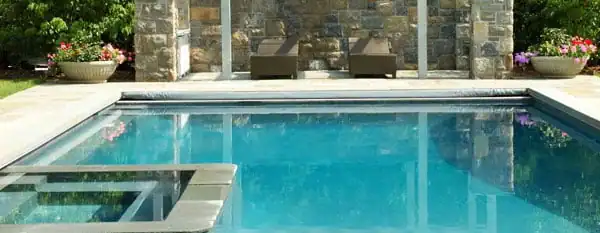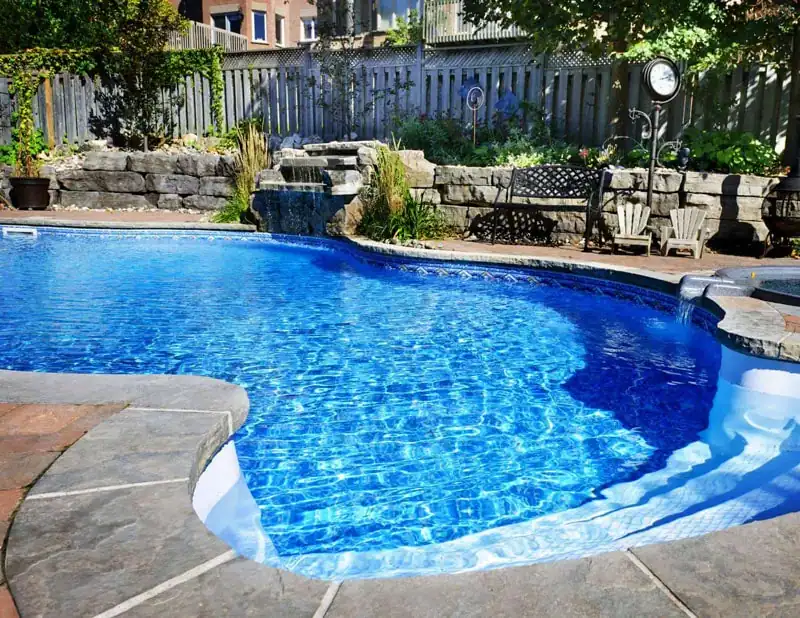Many pool owners are always looking for ways to maintain their pools and keep them in good condition. One question that often comes up is whether you can use water softener salt in your pool to cure problems with hard water.
Water softener salt is a common salt-based product that is used to soften hard water. While it might seem like it would soften hard water in your pool, it can cause damage to the pool’s plumbing and equipment. Water softeners use a special method to process the salt to produce water that has the minerals and most of the salt removed. Just dumping water softener salt into a pool will not accomplish having softened pool water.
Learn more about how Water Softener system process water and our recommendations for dealing with hard water in your pool.
What is Water Softener Salt?
Water softener salt is a type of salt used to regenerate ion exchange resins in water softening systems. It is specifically designed to remove hard water minerals such as calcium and magnesium from water, which can cause scaling and damage to pipes and appliances.
The Regeneration Process
Water softeners use salt (usually specially formulated sodium chloride), to remove minerals from hard water. During the regeneration process, the salt is dissolved in water to create a brine solution that is used to flush out the mineral buildup in the softener tank. The resulting softened water is then used for household purposes, such as washing dishes or doing laundry.
Are there Water Softening Systems for Pools?
Well, “never say never”, but in general a water softening system to generate enough water for a pool “doesn’t seem to be a thing”. I imagine that is because the price would be prohibitive or that there is just not a big market for water softener systems like that. Once the pool was full, the system would not have much of a purpose (the return on investment would be low).
Home water softener systems tend to be installed to soften the water used inside the home, but exclude the water for irrigation systems and to the outdoor hose bibs that you use to connect the garden hose. You could soften the outdoor water, but that’s not great for plants (they like the calcium and magnesium) and it’s expensive.
Some people who have home water softener systems figure out ways to slowly fill up their pool the first time, by running the water through the home softener until the regeneration cycle is triggered. They work out a way to run the water from inside the house to their pool. It depends on your system and the hardness of the water, but you might typically get 3000 gallons between cycles. If you had a rather small pool of 12,000 gallons, it would take four cycles and probably many days to fill the pool this way.
Water Softener Salt vs. Pool Salt
I think that part of the confusion is that people know that there are saltwater pools. While these pools systems are different in purpose (water sanitization vs. removing minerals), both systems use salt: Sodium Chloride as part of the process.
Saltwater pools use specially formulated Pool Salt is generally to work with Salt Chlorine Generator systems as a way to sanitize your pool without having to add Chlorine. To learn more about those systems and the pool salt that works with those systems, see: Chlorine to Saltwater Pool Conversion: Can it be Done? These systems do not soften the water, though. Any dissolved minerals in the water remain in the water.
It is not recommended to try to use water softener salt to replace pool salt. The formulations are different. Using water softener salt in your pool may void any warranty that you have on your Salt Chlorine Generator system.
If you are looking to select a Pool Salt to work with a Salt Chlorine Generator (also called a salt cell) system, please see our article Is All Pool Salt The Same? Understanding the Differences.

The Effects of Hard Water on Your Pool
Hard water, which is water that contains high levels of minerals such as calcium and magnesium, can cause several problems for your pool. It can lead to scaling and buildup on pool surfaces, clogged or corroded pool equipment, and stains on the liner or plaster.
Additionally, hard water can make it difficult to maintain the proper pH level and alkalinity in your pool. There are products made to help you reduce the amount of dissolved metals in your pool water, but generally they are not salt based.
Options for Dealing With Hard Water in Your Pool
Since softening water in pool sized quantities is a difficult thing to do, there are purpose made pool products that reduce metals and calcium in hard water, but they are not salt based. They will be labeled ‘metal remover’, ‘calcium decreaser’ or sometimes ‘stain remover’ – because high levels of dissolved metal in hard water can often cause a line of discoloration on you pool at the water line.
Final Thoughts
After considering all the factors, it is clear that using water softener salt in your pool is not recommended. While it may seem like a solution to combat hard water and calcium buildup, it will not soften your water without using a water softener system. It is better to seek out products that are designed for reducing calcium levels or removing other dissolved minerals from your water. These products are generally not salt based.







